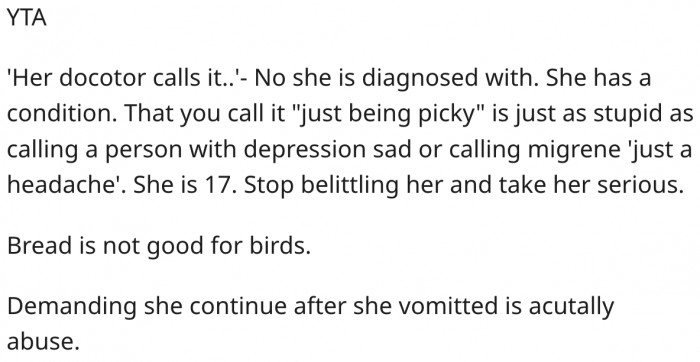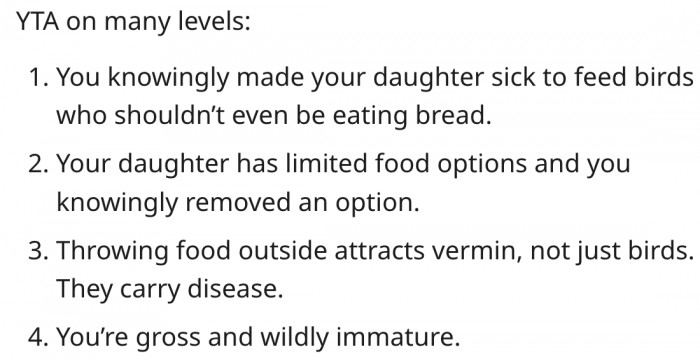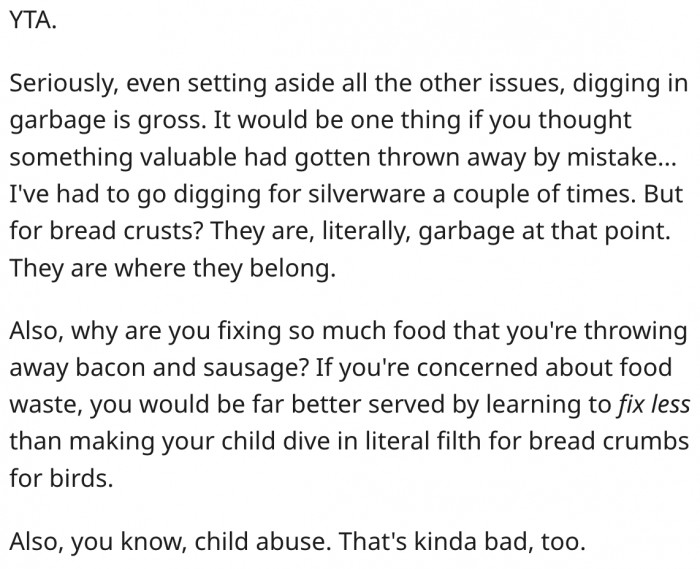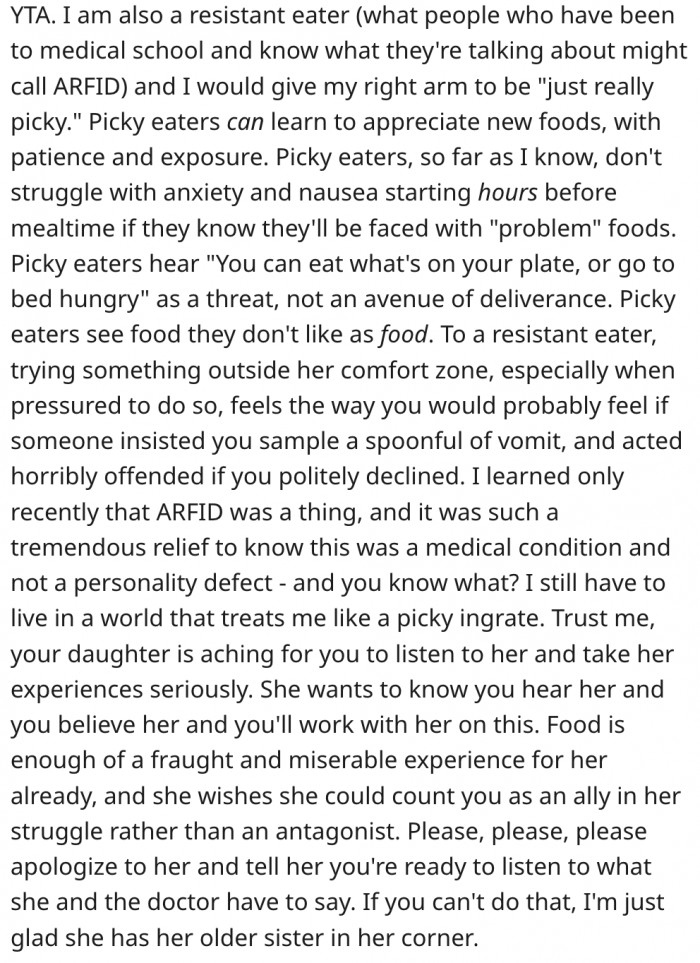Mom Forces Sick Daughter To Remove Crusts From The Food Waste Bin To Feed Birds
We all want to give our kids the best upbringing possible, but the advice on how to raise a child who is confident and compassionate is sometimes contradictory.
One Reddit user, Horror-Bookkeeper651, narrated on the AITA subreddit how she tried to get her 17-year-old daughter to feed leftovers to birds, but it didn't end well.
The woman said her daughter threw the crusts off her toast into the food waste bin one morning, despite having previously told her to always throw them out in the garden for the birds to eat. According to the woman, her daughter is sensitive to certain foods due to a disorder her doctor referred to as ARFID.
On this particular day, the woman instructed her daughter to pick the crusts from the food waste bin and throw them into the garden. Her daughter was adamant, stating that the waste bin contained leftovers from the previous night's dinner.
The woman insisted, and her daughter was forced to pick up the bread and throw it in the garden as instructed. However, while she was about to throw the third piece, she vomited. The woman still insisted that she should continue.
Annoyed, the woman's daughter told her to "f*ck off," took her laptop, and went into her room to attend online classes. Now, her older daughter is upset with her because she feels the younger daughter may hate toast forever.
After all, it's her fault that toast made her throw up. Is the woman wrong for forcing her daughter to pick the toast from the bin?
Here's what the AITA community thinks.
Here's how it began.

Her daughter suffers from ARFID that makes her extremely sensitive to certain foods.

After possibly putting her off toast and bread, here's what Reddit thinks.

Understanding Parent-Child Dynamics
This scenario raises profound questions about parent-child dynamics and the implications of authority and responsibility. Developmental psychology research emphasizes that parents often influence their children's emotional responses through their actions and expectations. A study from Stanford University highlights that children internalize parental behaviors, which can shape their emotional well-being and coping strategies.
In this case, the mother's insistence on her daughter feeding the birds may reflect a lack of awareness of the child's emotional state, potentially leading to negative outcomes.
1. The woman is belittling her daughter.

2. She isn't taking her daughter's health condition seriously.

3. The woman merely wants to prove a point.

The concept of emotional regulation is crucial in this scenario, as it pertains to how the daughter manages her feelings in response to her mother's demands. Research in clinical psychology indicates that children exposed to high-pressure environments may struggle with emotional regulation, leading to anxiety or distress. Understanding the importance of fostering emotional awareness can help parents create a more supportive environment for their children.
Encouraging open conversations about feelings and validating children's emotional experiences can promote healthier emotional development.
4. The bread won't attract birds. The woman is immature.

5. Bread is not healthy for birds.

6. The woman isn't remorseful about putting her daughter's health at risk.

The Importance of Compassionate Parenting
Compassionate parenting practices are vital for fostering healthy emotional development in children. Research from the University of Minnesota suggests that parents who demonstrate empathy and understanding significantly enhance their children's emotional resilience. This approach not only helps children cope with challenges but also strengthens the parent-child bond.
In this case, considering the daughter's feelings about the task at hand could lead to a more supportive and compassionate parenting style, ultimately benefiting both parties.
7. Her daughter will hate her forever for being an insensitive parent.

8. She should buy bird feed if she cares so much about birds.

9. The situation was unwarranted and wasn't worth it.

Implementing effective communication strategies can also enhance parent-child relationships. Techniques such as active listening and validating feelings can significantly improve emotional connections. According to research published in the Journal of Child Psychology, these strategies can foster a safe space for children to express their emotions, leading to healthier family dynamics.
Encouraging parents to engage in reflective conversations about their children's needs can help create an emotionally nurturing environment.
10. She should build a respectful relationship with her daughter instead of being controlling.

11. It's gross that she forced her daughter to take bread crusts from the garbage.

12. She's a terrible parent for different reasons.

13. She should stop downplaying her daughter's disorder.

14. The woman doesn't know that her daughter's health condition is serious.

15. There are better ways to handle the situation than making her daughter vomit.

16. Instead of being a supportive mother, she's a villain.

17. Birds don't need her bread to survive.

18. Her daughter's condition is serious, and it's ridiculous she's trying to downplay it.

19. She is an abusive parent.

20. She isn't qualified to be a parent.

What Do You Think?
Raising kids is one of the most challenging jobs in the world. Unfortunately, there is no clear-cut guideline on how to go about it, and parents must figure things out for themselves.
Discipline is an essential part of parenting, as it helps kids gain the skills they need to become responsible adults. However, parents must know when to shift grounds and when not to while enforcing discipline.
Psychological Analysis
This scenario reflects the complexities of parenting and the importance of considering a child's emotional needs. The mother's insistence on her daughter feeding the birds indicates a potential disconnect between her expectations and the child's emotional state. By fostering a more compassionate approach, parents can better support their children's emotional development and overall well-being.
Analysis generated by AI
Analysis & Alternative Approaches
Parent-child dynamics play a critical role in emotional development and well-being. According to the Journal of Family Psychology, compassionate and empathetic parenting can significantly enhance children's emotional resilience. By fostering open communication and emotional awareness, parents can create a nurturing environment that supports their children's emotional needs.



